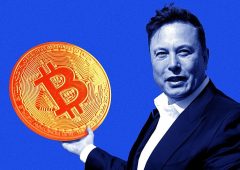Wall Street Veteran Warns Tariffs Could Disrupt AI-Driven Market Rally
05.06.2025 12:00 1 min. read Alexander Stefanov
Steve Eisman, the famed investor known for forecasting the 2008 housing collapse, is sounding the alarm—not on overvalued tech stocks or interest rates, but on the escalating risk of global trade disputes.
In a recent interview with CNBC, Eisman pointed to tariffs as his primary concern for the stock market. While investor sentiment has grown comfortable, he warned that negotiations, especially with complex blocs like the European Union, remain fraught with political and logistical hurdles. “Each EU country effectively has veto power,” he said, noting the difficulty of reaching unified agreements.
As for U.S.-China relations, Eisman admitted the outlook is too unpredictable to assess confidently. “There are just too many moving parts,” he said, adding that he’s reduced risk in his portfolio and is waiting to see how things unfold.
Despite optimism surrounding the artificial intelligence sector—fueled in part by NVIDIA’s blockbuster earnings, with revenue surging 69% in a single quarter—Eisman cautioned that geopolitical conflict could derail that momentum. He marveled at NVIDIA’s growth, calling it “insane,” but added a stark warning: “If a trade war breaks out, none of that will matter in the short run.”
For now, Eisman remains long on the market but more cautious than enthusiastic, keeping a watchful eye on rising trade tensions that could reshape the market’s near-term trajectory.
-
1
U.S. PCE Inflation Rises for First Time Since February, Fed Rate Cut Likely Delayed
27.06.2025 18:00 1 min. read -
2
Key U.S. Economic Events to Watch Next Week
06.07.2025 19:00 2 min. read -
3
Gold Beats U.S. Stock Market Over 25 Years, Even With Dividends Included
13.07.2025 15:00 1 min. read -
4
U.S. Announces Sweeping New Tariffs on 30+ Countries
12.07.2025 16:30 2 min. read -
5
US Inflation Heats Up in June, Fueling Uncertainty Around Fed Cuts
15.07.2025 16:15 2 min. read
JPMorgan Lawsuit Threatens Crypto Access and Open Banking Rights
JPMorgan and other major U.S. banks are under fire for a lawsuit aimed at dismantling the Consumer Financial Protection Bureau’s (CFPB) newly established “Open Banking Rule.”
Greed Holds as Market Momentum Builds: What is the Market Sentiment
The crypto market remains firmly in “Greed” territory, with CoinMarketCap’s Fear & Greed Index clocking in at 69/100 on July 19. Despite a modest 24-hour dip from 71, the index has now held above 60 for 11 consecutive days.
Top 7 Crypto Project Updates This Week
The crypto industry saw major advancements this past week across DeFi, NFT, Layer 2, and AI-powered platforms.
Peter Thiel-Backed Crypto Exchange Files for IPO
Cryptocurrency exchange Bullish, backed by billionaire investor Peter Thiel, has officially filed for an initial public offering (IPO), marking a major step toward entering the public markets.
-
1
U.S. PCE Inflation Rises for First Time Since February, Fed Rate Cut Likely Delayed
27.06.2025 18:00 1 min. read -
2
Key U.S. Economic Events to Watch Next Week
06.07.2025 19:00 2 min. read -
3
Gold Beats U.S. Stock Market Over 25 Years, Even With Dividends Included
13.07.2025 15:00 1 min. read -
4
U.S. Announces Sweeping New Tariffs on 30+ Countries
12.07.2025 16:30 2 min. read -
5
US Inflation Heats Up in June, Fueling Uncertainty Around Fed Cuts
15.07.2025 16:15 2 min. read


